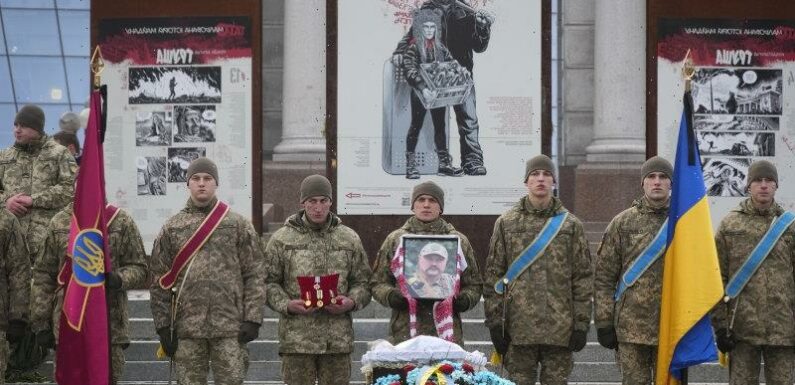
Kyiv: The Russian military claimed has to have carried out deadly missile strikes on barracks used by Ukrainian troops in retaliation for the deaths of dozens of Russian soldiers in a rocket attack a week ago, but Ukrainian officials denied there were any casualties.
The Russian Defence Ministry said its missiles hit two temporary bases housing 1300 Ukrainian troops in Kramatorsk, in the eastern Donetsk region, killing 600 of them. Ministry spokesman Igor Konashenkov said the strikes were retaliation for Ukraine’s attack in Makiivka on January 1, in which at least 89 Russian soldiers died.
Ukrainian servicemen commemorate on Sunday a comrade killed in battle with Russian forces in Donetsk region.Credit:AP
Serhii Cherevatyi, a spokesperson for Ukraine’s forces in the east, said that Russian strikes on Kramatorsk damaged only civilian infrastructure, adding: “The armed forces of Ukraine weren’t affected.”
A Reuters team visited the two dormitories that Moscow said had been temporarily housing Ukrainian personnel but neither appeared to have been directly hit or seriously damaged. There were no obvious signs that soldiers had been living there and no sign of bodies or traces of blood.
The Donetsk regional administration said seven Russian missiles hit Kramatorsk and two more hit Kostyantynivka, without causing any casualties. It said an educational institution, an industrial facility and garages were damaged in Kramatorsk, and an industrial zone was hit in Kostyantynivka.
Kramatorsk Mayor Oleksandr Honcharenko said two school buildings and eight apartment houses were hit overnight. Photos he posted showed no indication that it had been an attack on the scale claimed by the Russians or that anyone had been in the buildings when they were struck.
A Ukrainian helicopter fires at the Russian positions in the frontline in the Kherson region, Ukraine, Sunday, January 8, 2023.Credit:AP
“The world saw again these days that Russia lies even when it draws attention to the situation at the front with its own statements,” Ukrainian President Volodymyr Zelensky said in his nightly video address.
“Russian shelling of Kherson with incendiary ammunition right after Christmas. The strikes on Kramatorsk and other cities of the Donbas – aimed right at civilian sites and right when Moscow was reporting the supposed ‘silence’ of its army.”
Russia had declared a 36-hour cease-fire timed to coincide with Orthodox Christmas celebrations on Saturday. Ukraine denounced the pause as a ploy.
Russia said the attack on Kramatorsk was in retaliation for the Ukrainian rockets that destroyed a facility in Makiivka, also in the eastern Donetsk region, where Russian soldiers were gathered in the early hours of January 1. The attack, which Ukraine claimed killed 400 soldiers, was one of the deadliest on the Kremlin’s forces since the war began more than 10 months ago.
Also on Sunday, the Ukrainian military claimed to have hit a residential hall of a medical university in Rubizhne, a town in the Russian-occupied eastern Luhansk region, killing 14 Russian soldiers housed there. The number of wounded was unknown, it said.
Elsewhere in the east, Donetsk Governor Pavlo Kyrylenko said one person was killed in strikes on Bakhmut, and eight others were wounded. The battles for Bakhmut and the nearby town of Soledar remained among the bloodiest on the front, Zelensky said.
In the north-eastern Kharkiv region, the town of Merefa was hit during the night, killing one person, and two other settlements in the region were shelled, Governor Oleh Syniehubov said.
Russia and Ukraine exchanged prisoners on Sunday, swapping 50 on each side, according to Konashenkov, the spokesman for the Russian Defence Ministry, and Andriy Yermak, head of the Ukrainian president’s office.
AP, with Reuters
Get a note direct from our foreign correspondents on what’s making headlines around the world. Sign up for the weekly What in the World newsletter here.
Most Viewed in World
From our partners
Source: Read Full Article

